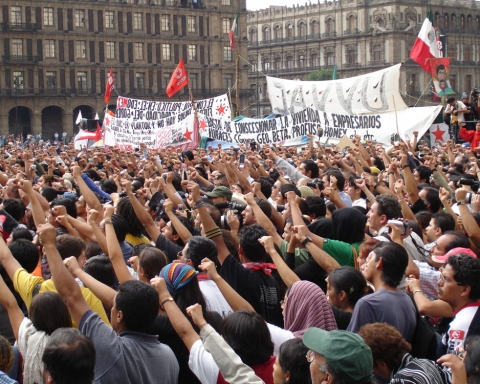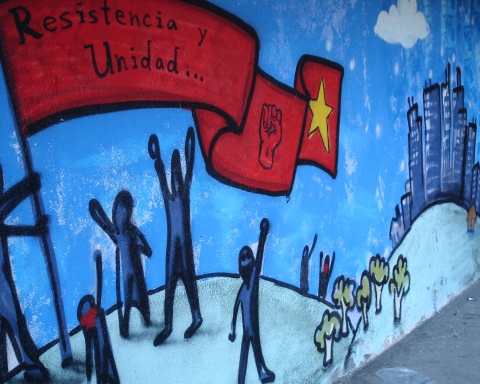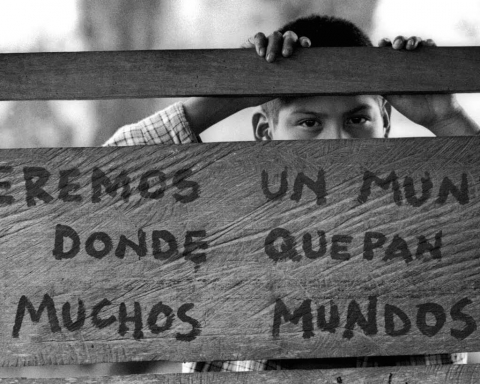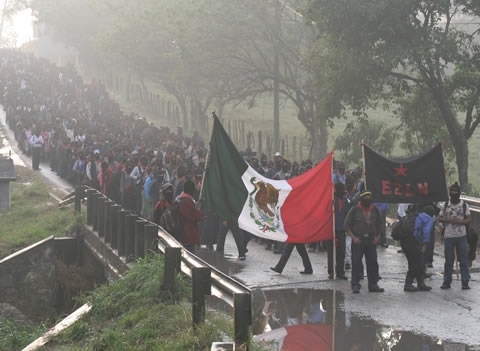This piece is published in Critical Thought in the Face of the Capitalist Hydra (2016)
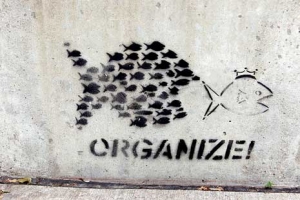
April-May 2015
To the compas of the Sixth:
To those who are reading because this interests them, even if they’re not part of the Sixth:
These days, just as every time this thing they call the “electoral process” rolls around, we hear and see all that stuff that comes out saying that the EZLN calls for abstention, that the EZLN says that people shouldn’t vote. They say this and other idiocies, these dunces who don’t study history or even care to find the truth. They even put these absurdities into history books and biographies and then charge for them. That is, they charge for these lies, like politicians. Of course, you know that we’re not interested in the things that those above do in order to try to convince those below that they’re concerned about them. As Zapatistas, we don’t call for people not to vote nor do we call them to vote. As Zapatistas, every time we get the chance, we tell people that they should organize to resist and to struggle for what they need. We as Zapatistas, like many other originary peoples of these lands, already know how the political parties operate, and it’s a bad history of bad people. And for us Zapatistas, it’s a history that we’ve left behind.
I think it was the late Tata[1] Juan Chavez Alonso who said that political parties separate and divide people, creating confrontation and conflicts between them, even among members of the same family. Here we see this happen again and again. You all know that in many of the communities where we live, there are people who aren’t Zapatistas and who aren’t organized and who are scraping by hoping that the bad government will give them a few handouts in exchange for letting them snap a photo that will make the government look good.
We see that every time there are elections, some people dress up in red, others in blue, others in green, others in yellow, and others in faded colors and so on. They fight amongst themselves and sometimes they even fight amongst family members. Why do they fight? Well, they fight over who is going to be in charge of them, who they are going to obey, who is going to give them orders. They think that whatever particular color wins, the people who supported that color will receive more handouts. They claim that they are very aware and yet very determined to be party members, and sometimes they even kill each other over a fucking [political party’s] color. It’s the same thing among all those who want a political position, regardless of whether they dress up in red, in blue, in green or yellow, or even in some new color. They say they are of the people and that therefore the people have to support them. But they aren’t of the people, they’re the same bad governments who one day are local representatives, the next day are union leaders, then they are party functionaries, and then municipal presidents. That is how they work, bouncing from one position to another and from one color to another. They are the same people as always, they have same last names, from the same families as always, the sons, grandchildren, uncles, nephews, relatives, brothers in-law, boyfriends, lovers, and friends of the same assholes[2] as always. They always say the same thing: that they are going to save the people; that this time they are going to behave themselves; that now they won’t steal so much; that they are going to help those who have nothing; and that they’re going to pull them out of poverty.
Well, then they spend their little money, which by the way is not theirs but rather what they take from tax revenue. But those assholes don’t spend that money to help those who are down-and-out. No, they spend it on their political propaganda, putting up posters and photos, buying radio advertisements and TV spots, placing ads in newspapers and magazines, and even buying time at the movies.
As soon as its clear who won, those people in the communities who are such loyal partidistas during the election and so determined about which color they’re supporting, all switch to the victorious color because they think that way they’re going to get their little handout. For example, supposedly now they’re going to give out televisions. Well, as Zapatistas, we say that what the people are being given is a garbage can because through this television what they are getting is a mountain of garbage. Regardless of whether the parties give out what was promised, at this point they can’t and won’t give them anything at all.
If the parties gave them anything, well, it was in order to make them lazy. The people even forgot how to work the land. They’re just there, waiting for the next government handout to arrive so they can waste it on booze. And there they are in their houses, making fun of us because we are working the land, while they just sit there waiting for their wife or daughter to return from collecting the government’s handout that they sent her to go pick up.
It goes on like this until the day comes that the handout doesn’t arrive. There is no notice that the handouts will stop; it isn’t announced in the paid press and no one comes any longer to tell them that they are their saviors. The handouts dry up. At that point, these brothers and sisters realize that they have nothing; that there is no money for booze, but there’s also no money for corn, beans, soap, or underwear. So they have to return to the land that they had abandoned, now so overgrown that they can’t even walk through it. Since they have forgotten how to work, soon their hands are covered in blisters and they can’t even hold a machete. That’s how useless they have become living off of handouts from the government instead of working.
This is already happening. They don’t talk about it in the news that’s controlled by the bad government. Quite the contrary, the news says that there is a ton of government programs. But none of this is getting to the people. Where does the money go that the government says it’s spending on handouts in the campaign against poverty? Well, we know that those above have already told these brothers and sisters that there is going to be less money or that there isn’t going to be any money at all. Do you really think that if the campesinos who were getting hand-outs stopped working, that those above distributing the handouts still work? Of course not. That guy above is also accustomed to getting something for nothing. He doesn’t know how to live honorably from his own work; he only knows how to live off his government position.
Well, now that there is less money, there are no handouts. All of the money remains up above. The governor takes a chunk; the judge takes some, so do the police, a bit goes to the local representative, some to the municipal president, some to the administrator, some to the campesino leader and well, there’s nothing left for the partidista families. Before there was a little something, but now there’s nothing. “What’s happening?” ask the partidistas. They think that this is happening because their chosen [political party] color is failing and so they try another color. But the result is the same. In their assemblies, the partidistas get angry. They shout and accuse each other of things, they call each other corrupt, traitors, and sell-outs. Ultimately, it’s both the ones who are shouting and being shouted at who are corrupt, traitors, and sell-outs.
So the ones that they call the base of the party lose hope, they start to worry and to feel bad. They stop joking because they realize that in the Zapatista homes there is corn, beans, vegetables, and a little bit of money for medicine and clothes. Our collective labor helps us support one another when there is a necessity. And for us, there is a clinic and there is a school. None of this is because the government has come to help us. We ourselves have helped one another as Zapatista compañeros and compañeroas of the Sixth.
So the partidista brother comes to us all sad and asks us what to do, saying that he is screwed. Well, you know what we say to him:
We don’t tell him that he should change to another party—the one that is now the least bad option. We don’t tell him to vote. Nor do we tell him not to vote. We don’t tell him that he should become a Zapatista because we already know, from our history, that not everyone has the strength or heart to be a Zapatista. We don’t make fun of him. We tell him that he should organize, plain and simple.
“And then what do I do?” he asks.
We say to him:
“Then you will see for yourself what to do, what emerges in your heart and your head. No one else is going to tell you what to do.”
And he says,
“The situation is really bad.”
We don’t lie to him, grandstand, or make speeches. We tell him the truth:
“It’s going to get worse.”
– * –
Well, we know that that’s how things are.
But as Zapatistas, we are clear that there are still people, in other parts of the city and countryside, who fall into the same trap as the partidistas. Being involved with the party seems very attractive, because you can get money without doing any work, without toiling away to make a few cents and have something dignified to eat, to clothe yourself and be able to take care of your health.
But what those above do is deceive people. That is their job and that is how they survive. And we see that there are still people who believe them, who still think that yes, the situation is going to get better, and that this leader is going to fix their problems. They still believe that this one is going to behave himself and not steal so much, and that he’ll only be involved in a couple of dodgy dealings. So they give him a chance.
We say that these are pieces of little histories that have to play themselves out, that people have to learn for themselves that no one will solve their problems for them. We say that instead we will have to solve these problems ourselves, as organized collectives. It is the people who create solutions, not leaders or parties, and we’re not saying this because it sounds nice, but because we see it in reality, because we are already living it.
– * –
It could be said that a long time ago, before they became part of the institutional apparatus, some of the partidistas on the left sought to build awareness among the people. They weren’t seeking power through elections, but rather to move people to organize themselves, struggle, and change the system—not just the government, the whole system.
Why do I say before they became partidistas of the institutional left? Well, because we know that there have been parties on the left that aren’t involved in the dealings of the world above. They have the same form as the political parties, but they don’t sell out, or give up, or change their belief that we must end the capitalist system. We as Zapatista know—and we don’t forget—that the history of struggle from below has also been written with their blood. But money is money, and above is above, and the partidistas of the institutional left have changed their thinking, and now they seek paid positions. It’s that simple, money—in other words, they’re looking to get paid.
Do you really think that it’s possible to create political consciousness by disdaining, humiliating, and scolding those below? Do you think it’s possible to do this by telling those below that they’re a bunch of freeloaders[3] who don’t think? By telling them that they are ignorant? Do you think that you create political consciousness by asking people to vote for you while simultaneously telling them that they’re fools who would sell out for a television? When someone says to you, “hey you, partidista of the left, this asshole who says that he’s the hope for the future actually used to work for the other colors [parties] and he’s still a rat,” do you think that you create consciousness by responding that whoever says this has sold out to Peña Nieto? Do you think that you create political consciousness by lying to people and telling them that we Zapatistas tell people not to vote, when actually you’re just reacting to the fact that you don’t have enough people on your voter rolls [to be recognized as an official party], that is, enough people to guarantee that you’ll receive [government] money and so you’re simply looking for someone to blame? Do you think that you create consciousness by having the same people work in your party who just recently used to be yellow, or red, or green or blue? Do you think that you create consciousness by saying that people who have no formal education shouldn’t vote and that they are poor because they are ignorant fools who only vote for the PRI?
If in Chiapas, Velasco literally slaps people,[4] those partidistas slap people around with their poorly-hidden racism. It is clear that the only thing about which those partidistas are creating consciousness is that in addition to being arrogant, they’re also idiots. What do these partidistas think? That after being insulted, lied to, and scolded, the people from below are going to get down on their knees in front of their color, vote for them, and beg to be saved?
We Zapatistas say that here is the proof that in order to be a party politician above, one has to be shameless, a fool, a criminal—or all three.
-*-
We say that we shouldn’t be afraid of having the people rule. It is the healthiest and most just way. It is the people themselves who are going to make the changes that are truly necessary. It is the only way that a new system of government is going to exist. It’s not that we don’t understand what choosing a candidate or participating in an election means. It’s just that we Zapatistas have a different calendar and geography for how to have elections in rebel territory, in resistance. We have our own ways in which the people truly choose, and not through spending millions, much less producing tons of plastic rubbish and posters with photos of rats and criminals.
It is true that it’s been barely 20 years now that we’ve been choosing our autonomous authorities through real democracy. But this is how we have been able to move forward, with the freedom that we have achieved for ourselves and with an ‘other’ justice, that of an organized people. Here thousands of women and men are involved in the process of electing our authorities and everyone comes to agreement and organizes to ensure compliance with the mandate of the people. It is a system where the people organize to determine the work that will be undertaken by those authorities. In other words, the people command their government.
The people organize in assemblies where they begin to express their opinions, and from there, proposals emerge, and these proposals are studied for their advantages and disadvantages to decide which one is best. Before making a decision, the proposals are taken back to the people and the assembly for approval. In this way, a decision can be made in accordance with the majority of the communities.
This is Zapatista life in the communities. It has become our culture. Does this all seem very slow to you? That is why we say we do things according to our calendar. Do you think we can only do this because we are indigenous peoples? That is why we say that it is according to our geography. It is true that we have made many mistakes and have had many failures. It is also true that we will have more. But they are our failures. We make them and we pay for them.
This is different than in the political parties where the leaders make mistakes, where they even get paid for them, and then those below pay the price. That is why the elections coming in the month of June mean nothing to us either way. We don’t call for people to vote, nor do we call for them not to vote. It just doesn’t interest us. What’s more, it doesn’t worry us. What interests us as Zapatistas is knowing how to resist and confront the many heads of the capitalist system that exploits us, represses us, disappears us, and steals from us.
It is not just in one place or in one way that capitalism oppresses you. It oppresses you if you’re a woman. It oppresses you if you’re a white-collar worker. It oppresses you if you’re a blue-collar worker. It oppresses you if you’re a campesino. It oppresses you if you’re a young person. It oppresses you if you are a child. It oppresses you if you’re a teacher. It oppresses you if you’re a student. It oppresses you if you’re an artist. It oppresses you if you think. It oppresses you if you are human or plant or water or earth or air or animal. It doesn’t matter how many times they wash or perfume it, the capitalist system is still “dripping from head to toe, from every pore, with blood and dirt” (it’s on you to figure out who wrote this and where).[5]
So our idea isn’t to promote voting. It’s also not to promote abstention or nullifying your vote. It’s not to provide recipes for how to confront capitalism. Nor is it to impose our thinking on others.
The idea of this seminar is to look at the different heads of the capitalist system to try to understand whether it has new ways of attacking us or whether they are the same ones as before. If we are interested in other ways of thinking, it is in order to see if we are right about what we think is coming—that there will be a tremendous economic crisis that will be added to existing evils and do tremendous damage to everyone everywhere, all over the world. So if it’s true that this is coming, or that it’s already happening, we need to think about whether it will work to keep doing the same things that have been done before.
We think that each of us has an obligation to think, to analyze, to reflect, to critique, to find our own pace, our own way, in our own places and times. Now, I ask those of you who are reading this, whether you vote or don’t vote: will it do you any harm to think about what is going on in this world that we live in, to analyze it, to understand it? Does thinking critically impede voting or abstaining from voting? Will it help us to organize or won’t it?
– * –
Finishing up on elections: Just so that it’s very clear and you aren’t misled about what we say and don’t say. We understand that there are those who think that it is possible to change the system by voting in elections. We say that’s a difficult position because it is the boss himself who organizes the elections, who decides who the candidates are, who says how, when, and where to vote, who announces who wins, and who says whether the election was legal or not. Well, there are people who think that this can work. That’s fine, we don’t say it can’t, but we also don’t say it can.
So, whether you vote for a color, for one of the washed-out colors, or you don’t vote: what we say is that we have to organize ourselves and take into our own hands the decision of who governs and find a way to make them obey the people. If you already decided that you won’t go vote, we don’t say that’s good, nor do we say that it’s bad. We only say that we think that it’s not enough, that besides all that, you have to organize yourselves. Of course, you also have to prepare yourself because they will blame you for the poor showing of the institutional parties of the left.
If you have already decided that you are going to vote and you already know who you will vote for, well same thing, our opinion isn’t that that’s good or bad. What we do say is that you should prepare yourself because you’re going to be enraged by the cheating and fraud that will occur. Those in Power are experts in cheating; what’s going to happen has already been decided by those above.
We also know that there are leaders who deceive the people. They say that there are only two paths to change the system: the electoral struggle or the armed struggle. They say this because they’re ignorant or shameless, or both. First of all, they aren’t fighting to change the system, or to take power, but to be government. That’s not the same thing. They say that once they are in government, they will do good things, but they are careful to make it clear that they’re not going to change the system; they’re only going to get rid of the worst aspects of the system.
Perhaps they should study a little and learn that to be in government isn’t to have Power. You can see that they don’t realize that if they get rid of the bad parts of capitalism [as they say they want to do], then it won’t be capitalism anymore. I’m going to tell you why: because capitalism is the exploitation of man by man, of the many by the few. Even if the system includes women, it’s the same. Even if it begins to include otroas, it’s the same. It’s still the system where unoas enrich themselves with the work of otroas. The otroas above are few, and the otroas below are many. If those partidistas say that this is fine and they just have to be careful that they don’t push it too far, that’s fine, let them say it.
But there are more than the two ways that they describe to get into government (the armed path and the electoral path). They forget that the government can also be bought (or have they already forgotten how Peña Nieto got there?) Not only that, but perhaps they’ve also forgotten that it’s possible to rule without being in government. If these people say that it’s only possible to get into government through weapons or elections, the only thing they are actually saying is that they don’t know their own history, that they haven’t studied it, that they have no imagination, and that they have no shame. It would be healthy for them to see just a little of what happens below. But they can’t; their necks have cramped because they’ve been so set on looking above.
That is why we Zapatistas don’t get tired of saying organize yourselves. Let’s organize ourselves. Each person where they are must struggle to organize themselves. Let’s work to organize ourselves. Let’s begin by thinking how to start organizing and let’s gather together in order to unite our organizations for a world where the people rule and the government obeys. In sum, as we said before, and as we say now: whether you vote or not, get organized.
And well, we Zapatistas think that we have to have good ideas in order to organize ourselves, which is to say, we need theory; we need critical thought. With critical thought we can analyze the ways of the enemy, of the one who oppresses us, exploits us, represses us, devalues us, and steals from us. But with critical thought we can also examine our own path, our own steps.
For this reason, we are calling on all of the Sixth to have meetings of thought, analysis, theory; about how you see the world, your struggle, and your history.
We call on all of you to have your own seminars and share with us the ideas that you cultivate there.
– * –
As Zapatistas, we are going to continue governing ourselves as we already do: here the people rule and the government obeys.
As our Zapatista compañeros say: Hay lum tujbil vitil ayotik. Which means: how good it is, the way that we are now.
Another: Nunca ya kikitaybajtic bitilon zapatista. Which means: we will never stop being Zapatistas.
One more: Jatoj kalal yax chamon te yax voon sok viil zapatista. Which means: even after I’m dead, I’ll still be a Zapatista.
From the mountains of the Mexican Southeast.
In the name of the EZLN, the men, women, children and elders of the Zapatista Army for National Liberation.
Subcomandante Insurgente Moisés
Mexico, April-May of 2015.
NOTES
[1] Father, or elder. A term of respect.
[2] The text uses “cabrón,” like bully or asshole, and “cabra,” (literally “goat”), playing with the feminine form of gendered nouns in Spanish.
[3] In the original text this is “come-tortas,” or “sandwich-gobblers,” a reference to those who accept gifts or handouts—often a sandwich at a rally—from the political parties in return for support.
[4] A reference to Chiapas governor Manuel Velasco slapping an assistant at a public event on December 9, 2014, which was caught on camera.
[5] From Karl Marx’ Capital Volume 1, Chapter 31.




